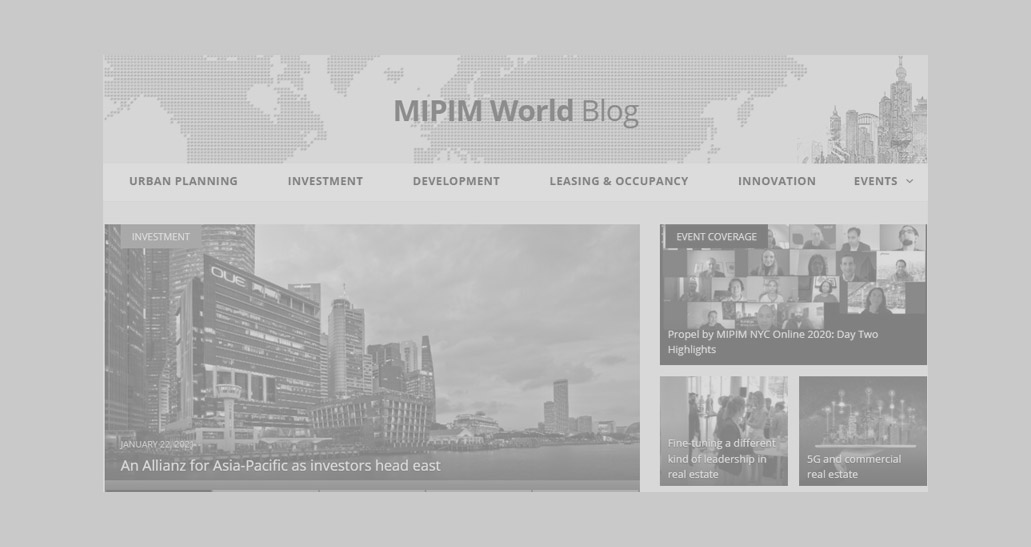The effects of the pandemic on US real estate market trends are likely to permanently shift the industry’s direction of travel, according to an expert panel assembled by Propel by MIPIM.
‘if you think that the changes happening in the market are going to be temporary, you’re going to be in for a rude awakening,’ affirmed Romito, speaking both as an occupier – as CEO of VTS – and an industry expert, with a range of insights into landlord and tenant relationships across a range of asset classes. ‘This is not a short-term revolution but a long-term evolution.’
The fourth and final webinar in the Leaders’ Perspectives program, dubbed The Changing Face of Commercial Real Estate: Top National US Real Estate Leaders React to Changing Market Dynamics, placed proptech unicorn co-founder Nick Romito, CEO of VTS, head-to-head with Adam L. Stanley, Global CIO of real estate services firm Cushman & Wakefield. The insightful debate was moderated by Jay Neveloff, Partner and Chair, Real Estate, at law firm Kramer Levin.
Stanley agreed: ‘While Covid is certainly accelerating some of the trends that we were starting to see, the trends were already there, and frankly, this is just waking people up.’
Both experts concurred that the industry is in a ‘survival of the fittest’ moment, with Stanley noting: ‘You can either be extremely negative about 2020 or you can use it as the year to seed what happens at the end of 2021 and in 2022. The smarter companies, the stronger companies are going to be thinking about how the new normal will look for them, how they will react, and how they are going to emerge on the other side of the recession. Other companies will stick their heads in the sand and wait too long, and will probably go out of business.’
However, Romito was positive about the industry’s potential for rebounding in the face of the virus, and suggested that recovery wouldn’t be as slow as it had been after the global financial crisis. ‘Next year is going to be the year we deal with it… 2022 we’re hopefully getting back towards a V-shaped recovery, due to the strong fundamentals. For me this looks more like 9/11 than it does 2008/2009.’
Key US real estate market trends
Neveloff opened the debate by describing the coronavirus crisis as ‘the elephant in the room’ for US real estate market trends, ‘having an enormous impact on the industry, the economy and the world in general’.
The panelists noted that while the logistics asset class was one of the beneficiaries of the crisis, sectors such as retail were bearing the brunt of the pandemic’s headwinds. Said Romito: ‘Retail was feeling pain obviously before Covid… but this has been the salt in the wound for the industry. There’s no doubt that the asset class is going through a really massive transformation, but I think the plane’s going to land, although it’s not clear where.’
Added Stanley: ‘I do think that every five or 10 years we hear that retail is dead… and that’s something I love to dispel. People say it’s dead because of Amazon… well, Amazon is retail. And retail is evolving.’
Stanley highlighted how remote work had already been increasing pre-Covid, also due to changing demographics plus recessionary factors. ‘Covid has just amped up the conversations around US real estate market trends,’ he said.
Office occupancy
One of the key themes that emerged in the debate on major US real estate market trends was that of office occupancy dynamics; both how they have been affected by the coronavirus crisis and how they might shift in the future.
Romito described how leasing activity in the top six markets in the US – New York, San Francisco, LA, Washington DC, Chicago and Boston ‘was up 21% year-over-year in terms of new requirements entering the market in January’ before ‘slowing’ in February. ‘Then, once a stay at home order hit, it fell off a cliff. There were no new active requirements in New York City for around five weeks. That’s unheard of.’ He added: ‘Today, we’re around 70% down year-over-year in terms of new tenants entering the market… I think the market is going to get softer before it gets better.’
‘Our study shows that leasing probably won’t recover until around 2022. Of course, every market is different,’ Stanley added, but highlighted trends which might assist recovery rates. ‘People are going to want to go back to the office at some point, and the Covid trend will slow down. Meanwhile, de-densification – with firms forced to socially distance employees – is offsetting remote work trends in terms of square feet requirements.’
Romito said that as an occupier, he had been implementing safety protocols for his office which including a self-reporting system to assess the health of individuals and stipulating just 20% office occupancy by personnel. ‘As a tech company, we’re very dense, we were probably at 100 sq ft per person, which doesn’t work in a Covid environment, and we were without private offices,’ Romito noted. However, he added that VTS wouldn’t be taking quick decisions about cutting its space requirements, highlighting a thought process which might bode well for the industry. ‘We’re going to hold tight for a few more months and see how this plays out. The benefit of all of us learning how to do this remote working thing is that it gives us time.’
US real estate market trends: some conclusions
For Stanley, the pandemic has created an opportunity to focus the application of technology to give mechanisms such as remote working real purpose, as well as redefining the importance of the ‘optimization of real estate footprints’. He added that some emerging US real estate market trends were actually largely positive: ‘I love curbside delivery and even after the vaccine is found, I hope that restaurants have learned new ways of delivering service. I also hope hotels have learned to be cleaner and safer; and that offices are used for effective collaboration and not just to be seen by the boss or the client. I think it’s great that people aren’t wasting tons of fuel flying to the other side of the country for a one-hour meeting and I hope that stays. So, I’m optimistic that some of the challenges that we face this year will actually turn into really positive outcomes for the economy, for employees, and ultimately for the environment as well.’
Romito agreed, quipping that, like Winston Churchill, he thought the industry should endeavor to ‘not waste a good crisis’. He concluded: ‘This is the time for people to reinvent themselves – their businesses and how they think about the world. If that’s your mindset, you’ll find a silver lining. And by tail-end 2021, the start of 2022… that’s when we’re going to see some more sunlight and growth.’
Want more insights from the discussion? Listen to the Propel Insights podcast episode:
Or watch the full webinar replay here.




